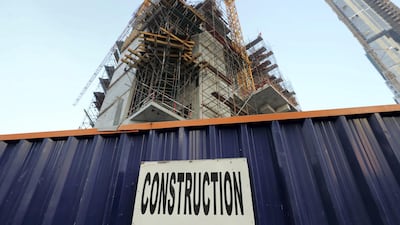Hundreds of Indian and Bangladeshi construction workers are pursuing their employer for unpaid wages stretching back 10 months, consular officials said.
About 900 men living in company accommodation in Dubai and Ras Al Khaimah appealed to officials to help after downing tools last year.
The Indian consulate and the Bangladesh embassy have been working with labour ministry officials to convince the company to make the payments so the workers can return home.
Electricity was cut off to their camp in Dubai for a few days in December after workers stopped working. It was restored when consular officials intervened.
Calls and emails to the company, a general contractor based in Garhoud, went unanswered. The firm claims it does not have the money to pay, Indian consulate officials said.
The government has warned companies it will cancel work permits, effectively shutting off operations, if they fail to pay and encourage workers to report late wages to the authorities.
A senior labour department official at Dubai Courts told The National that several options are being looked at, including that the Dh3,000 security deposit that businesses pay when they hire an employee be handed over to each worker.
But the dues of some labourers - who say they are owed between three and 10 months wages - amount to more than Dh10,000 and they remain in the country hoping the case is resolved.
“We just want to be paid for our work. We filed a case in April and we have not yet got any money. We keep being told that it will happen soon," said SK, an Indian carpenter who filed a legal case against the company last year along with at least nine others.
"We are in a bad state because we cannot send money home and we rely on food sent to us by the consulates.”
They were then assured of a settlement by the company including end-of-service benefits, he said.

Like many of the workers, his visa and emirates identity card has expired.
He has worked with the company for more than a decade and is paid between Dh600 to Dh1,200 per month. He said salary payments have been delayed for the past four years.
“I’m owed Dh13,000. But now they (the company) have told us to take Dh3,000 and leave. How is that enough for the work we have done?" said the worker, who filed a case in the labour court alongside more than a dozen others.
"We have also spent money on the court case. If we leave here, we may never get the money.
“We are surviving because of food given to us by the consulates. The electricity is shut off for a few days and it is turned on when we protest. How long can this go on?”
The Indian consulate confirmed that the largest number of workers are from the sub-continent.
“There are about 600 Indians in three camps in DIP (Dubai Investment Park), Sonapur and Ras Al Khaimah and an equal number of Bangladesh and Pakistanis among the 900 workers,” said Mr Vipul, the Indian Consul General in Dubai.
“Most have not been paid for more than 10 months and some went on strike because of this. They said they were not paid so they would not work. The workers have asked for end-of-service benefits. The company says they don’t have the money, so it is a vicious circle.”
The case has been taken up with the Ministry of Human Resources and Emiratisation.
Muhammed Imran, Bangladesh's ambassador to the UAE, said officials were in contact with about 300 of their citizens who have not been paid.
“The company has assured us they will take some remedial measure on the non-payment," he said.
The Indian consulate asked community organisations and volunteers to supply food such as rice, lentils, potatoes and toiletries such as soaps, toothbrushes and toothpaste to the workers, who have run out of funds.
Voluntary workers said the response from the community to donate essentials to the workers has been strong.
“We just have to ask for supplies and people immediately come forward to help,” said Kusum Dutta, who has organised food for workers in the Dubai camp.
“We are just doing our best to help because these men need basic supplies and have no money left.”


